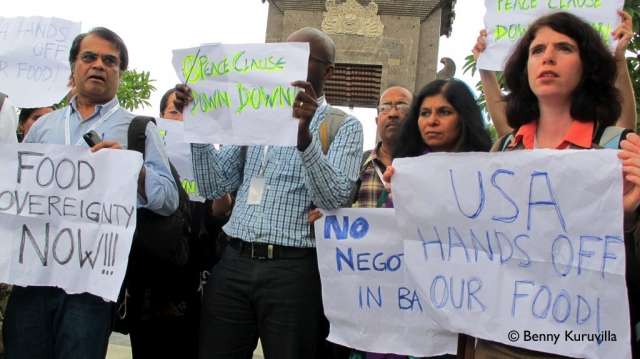Interview with Dr Chalmers Johnson With Herbert Docena and Tom Reifer October 8, 2002, Cardiff by the Sea, California
What are the implications of the new doctrine of preemptive strikes for US military posture in East Asia?
The doctrine is outrageous, unprecedented, and illegal. Itนs a violation of the UN Charter, a ratified treaty, and the constitution of the United States says that treaties are the law of the land. Tony Blair’s Labor Party’s chief attorney basically said the other day to the Prime Minister that a regime-change-type invasion of Iraq would be illegal, in violation of British laws.
Moreover, concretely, a truly comparable case would be the Cuban missile crisis in which we now know from Arthur Schlesinger that the military proposed a preemptive attack against Soviet missile sites in Cuba and Robert Kennedy said, “Weนre not that kind of country. We donนt do that. That’s illegal. That’s beyond the pale.” That turned the entire planning crew from
attack to blockade and to a different kind of strategy, a more peaceful approach to the Cuban missile crisis.
What does it mean today? The interesting thing to me is that I have the feeling the military today is probably more opposed to it than the defense intellectuals who are actually calling the shots. These “chicken hawks” as they’re sometimes called, because they never actually served in the military in any capacity, go back to a group of people whose intellectual mindset was
nonetheless formulated by the loss of the war in Vietnam. They’ve still never quite been able to believe that. They advised the Reagan administration in a disastrous way to basically continue the Vietnam War in Central America against the Sandinistas to try to demonstrate how ruthless we could be. It produced the worst decades for the countries of Central America since the Spanish conquest, an unmitigated disaster of war crimes and other such things.
Yet today, our former ambassador to Honduras is our ambassador to the United Nations. He should hope the US doesnนt become part of the International Criminal Court because he would be one of the prime candidates in my list to indict tomorrow for the things heนs done while Honduras was the largest CIA base in Central America in support of the so-called contras, or counterrevolutionaries, against the Nicaraguan government.
These defense intellectuals ญ Wolfowitz, Richard Perle, Richard Armitage, and I include Colin Powell, for the only thing that makes him slightly different is that he is a combat veteran ญ all made a great classical, fundamental mistake. They concluded that the Soviet Union fell apart because of something we did. That it was “Star Wars” or something like that that drove Soviet Union over the edge. People who worked on the Soviet Union know with precision that the USSR fell apart because of domestic,
internal, economic contradictions driven largely by ideology, plus imperial overstretch, plus an inability to reform.
These activist right-wing military enthusiasts are in the current government. They served in the Reagan government in lesser posts and never rose to the point of challenging the views of Mr. Schultz, Mr. Weinberger, or people like that. They then became more important figures in the first Bush administration but the Bush administration was surprised by the collapse of the Soviet Union. At the very end of the Bush administration, these people began to write about what had happened and they came up with what you could only call a version of “victory culture” ญ that we won the Cold War.
Having concluded that we had won, they seemed to go slightly mad. They started to talk about the Roman empire without any knowledge of Roman history, particularly of the fact that the Roman empire was a military dictatorship. These people began to think in terms of the United States as a colossus. They came to power spectacularly with the George Bush coup d’etat of 2001 and were then amazingly energized by the attack of September 11 later that year. Yet there are many aspects to their policies other than preemption. Preemption is just a way to label it now.
First of all there is ballistic Missile Defense (BMD) which I think they went for because they thought it was associated with the Reagan era and that they could revive it. Ballistic missile defense is important as a step to two things: identifying China as a target and putting weapons in outer space. Much of the research for what would be necessary to truly neutralize China or to put weapons in outer space is to be done under cover of ballistic missile defense. Nobody believes in missile defense at all.
Sakarov, a man who truly deserves his Nobel Prize, has already demonstrated to us that it’s very easy to overcome a BMD apparatus and how to do it is well understood. Therefore, there was something always a little fake about ballistic missile defense.
BMD gave these people the opportunity to start showing off. Today, the Republican Party in America wants to develop the kind of electoral strength that Franklin Roosevelt did for the Democratic Party in the 1930s. They have some extremely shrewd people working on this and there are a couple of critical elements involved.
One is the belief that they could possibly attract most American Jews to the Republican Party. Jewish Americans in many cases represent well-to-do professionals and many of them are emotionally involved in Israel, a country smaller than and with less population than Hong Kong. Then there is this whole other odd world of American nationalism caught up in Christian fundamentalism.
When you put all those things together, then you come up with a preemptive doctrine or a preventive doctrine, something that is hard to discuss rationally because itนs so absurd on the surface. Preemption actually does exist in international law, that if you can see people mobilizing against you, you can attack them. Itนs not an illegal act but it is a very unusual one. Preventive war is genuinely illegal and thatนs what theyนre talking about here. It is such an extreme position and so utterly destructive of the entire apparatus of international law but that is what these people want to destroy.
Could you tell us specifically what you think the implications of this doctrine are in East Asia. Additionally, what role do you think is likely to be played by US bases and presence in East and Southeast Asia including the Philippines, if any, in the invasion of Iraq?
First of all, one must preface any remarks by saying this is entirely speculative since we are talking about something in the future. But part of this coalition that Iนve been describing also includes the professional American military.
These people see themselves as defenders of the country, betrayed by the press and betrayed by unthinking liberals. The rest of the world wants to believe that what they actually see happening isn’t really happening, that it’s just overblown in the press, and that rational minds will prevail. They can’t really believe that the United States has been taken over by a group of homicidal maniacs or Nazis or whatever the hell they are. But the evidence is increasing that this is precisely the case.
The Japanese government instantaneously came out and tried to reassure their public ญ and this was widely reported in the Japanese press ญ that the American bases in Japan would not automatically be involved in the war on Iraq. At the same time, they know full well that the Kitty Hawk is based at the US Naval Base in Yokosuka; it was used in Afghanistan. One of the main
launching points for a war in the Middle East will be the 3rd Marine Division in Okinawa.
Moreover, the United States show signs of exploiting every single war to enlarge the base structure, not to shrink it, as we have seen in the Persian Gulf War. We now have bases in Qatar, United Arab Emirates, Saudi Arabia, Kuwait, Oman. We were not in many of these places before. In the wake of the Afghan war, we have bases in Bahrain, Uzbekistan, Tajikistan, Kyrgyzstan
ญ places where no one ever before imagined we would be.
To answer your question directly, the bases in East Asia will be maintained at all costs. The Americans will be ruthless in keeping them. If a government should come to power in one of these countries that is opposed to the bases, the Americans will use everything in their power to undercut that government, including a CIA-engineered “regime change.” Mr. Wolfowitz is a
former ambassador to Jakarta, but he and others like him really don’t know much about Indonesia. They find it hard to believe that Indonesians actually carry their Islam very lightly. Obviously there are exceptions like Aceh and other places like that. Still, the Islam of Indonesia is not an enemy unless we make it an enemy.
What in your view are the main objectives of US military build-up in the Philippines and do you see the anti-China component as the central motivation?
I don’t think the central motivation is the anti-China component. I think this is part of its justification, but the primary motivation is a U.S. return to the Philippines. We were there from 1898; we had great difficulty believing that a combination of the Philippine Senate, Mount Pinatubo, and other such things got us kicked us out. The military has been obsessed from the day it happened with how to get back in.
Moreover, the Under Secretary of State right now is Richard Armitage, who was the official doing the base negotiation in 1991 and 1992, when he developed a reputation for being an extremely arrogant, rather stupid bullheaded negotiator who didnนt have a clue as to the attitudes of the Filipinos. He didnนt even understand that the Philippine Senate was actually filled with quite conservative people, not a bunch of radicals. They had all been insulted and treated badly by Marcos, and they were deeply
disappointed that the United States had so deceived them by supporting Marcos. These were basically pro-America, well-to-do elite Filipinos who voted against extending the leases on Subic Bay because of American ignorance and insensitivity.
So you don’t agree with the assertion that thereนs a shift from constructing permanent bases to temporary military exercises?
I think thatนs a lie. I believe that’s what the American government would say. Any East Asian politician understands how dangerous and threatening the United States can be. Somebody who’s been a genius at this is Kim Dae Jung,
the President of South Korea. He set out with his “Sunshine Policy” to do something he knew the Americans weren’t going like. He therefore forever said, and even got Kim Jong Il to say, “We want to keep the American troops in Korea.” But why on earth would you want the American troops in Korea if you were unified? He was, I think, trying to make sure that the Americans
never truly got wind of what was going on.
The thinking in the Philippines is that the Americans are no longer interested in bases because theyนre supposedly more costly than “military exercises” or access rights because it allows them more flexibility. Right now, a big issue is the Mutual Logistics Support Agreement.
It is perfectly plausible for the Americans also to be seeking the same kind of agreements they got in Singapore, where they can moor very large aircraft carriers. Moreover, this eases problems that the Americans have slowly begun to discover in places like Okinawa and Korea. People will accept the arrival of some kind of a special mission or special operations, just as the
Thai accept the arrival of the Cobra Gold military exercises every spring time because the Americans are going to go away after two weeks or a month, get back on their ships and leave.
But again, if youนre talking about countering China, then the Americans are going to want permanent facilities for longer range operations. I think this collaborative military exercises issue is nonsense. We donนt know why we should be collaborating with the Philippine military. Do they need instruction? In what? Since when are we good at it? Are we educating them in state terrorism? Is this a sort of portable version of the College of Americas? Are we trying to create out of the Philippine military an
American fifth column?
One of the reasons the Americans are interested in bases is that they live much better on these bases than they do in the United States. The 3rd Marine Division lives much better in Okinawa than they do in Oceanside, California, next door to Camp Pendleton. It’s the same way the Soviet troops didn’t want to leave East Germany after the Berlin wall came down. They were more
comfortable in East Germany than they were in Russia. So I would find it very hard to believe that the Americans have given up on bases, particularly when one sees them building such massive bases as Bondsteel in the Balkans. Itนs huge, the largest base we’ve ever built and it’s permanent. We’re building an air base in Qatar. There are huge bases being built in Oman.
Moreover, in the Philippines it would not just be a naval presence but an airfield. Clark field will probably never be reopened, but the Americansneed an airfield with B2 bombers on it. For the time being, it is quite true that they like places like Diego Garcia or Guam. One of the things they like about Diego Garcia is that the British made it extremely convenient for them, taking every Diego Garcian and deporting them to the Seychelle Islands. The entire population of Diego Garcia was shipped out. So the
Americans are now saying in their reports, “We have no domestic political problems.” I think China ultimately figures in the plotting of these bases, but I also think that standing behind it and more alarming to me is this sense of America as a modern Rome.









